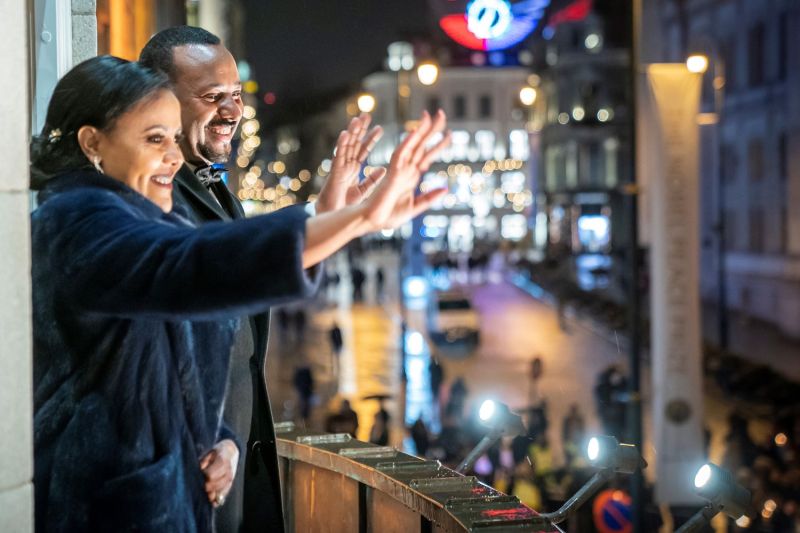The Nobel Peace Prize-winning prime minister has disbanded Africa’s largest political party in an effort to reinvent the country’s politics—but some powerful players stand to lose, and they won’t go quietly.
BY TOM GARDNER

The Ethiopian Peoples’ Revolutionary Democratic Front (EPRDF) was once Africa’s largest, and arguably most powerful, political party. It was also, thanks to its business interests, its richest. Since coming to power in 1991, the coalition party controlled each tier of government in Africa’s second most-populous nation. In the last national election, held in 2015, it won every seat in the federal parliament.
Until as recently as 2016, it seemed indomitable, its leadership boasting that the vision set out by former Prime Minister Meles Zenawi would guide the country for decades into the future. Yet, on Dec. 1, 2019, the EPRDF quietly disappeared—“demolished,” according to one of its former leaders, “with betrayal.”
In its place a new party was formed, led by Ethiopia’s new prime minister and the EPRDF’s last chairman, Abiy Ahmed—heralding, according to its supporters, an entirely new mode of politics. The Prosperity Party (PP) has done away with the four-part ethnic coalition structure which made up the EPRDF: the Tigrayan Peoples’ Liberation Front, the Amhara National Democratic Movement (later Amhara Democratic Party), the Oromo Peoples’ Democratic Organization (later Oromo Democratic Party), and the Southern Ethiopian Peoples’ Democratic Movement. It will instead be a single organization spanning the entire country.
To its supporters, the PP offers an escape from the divisive and, increasingly deadly, ethnic politics which characterized three decades of EPRDF rule. To its critics, it is the thin end of the wedge towards abandonment of the 1995 constitution and the principle of ethnic self-rule—ethnic federalism—which it enshrines. It is perhaps the single most significant—some say boldest—move yet from the Nobel Peace Prize-winning prime minister. But it could also tear an already desperately polarized country even further apart.
Two new books provide some insight into how Ethiopia reached this epochal juncture. In Laying the Past to Rest, former insider Mulugeta Gebrehiwot Berhe narrates the history of the EPRDF from its origins in the student movement of the 1960s through the untimely death of Meles, its chief ideological architect, in 2012. Appropriately, given his background as one its early founders, the book focuses on TPLF, the ethnic Tigrayan guerrilla movement which created the EPRDF in the late 1980s during the struggle against the Marxist junta known as the Derg, and dominated it from the latter’s overthrow in 1991 until Abiy’s appointment in early 2018.
Though the book stops before the EPRDF’s final act, it nonetheless helps explain the mindset—a mixture of conviction and arrogance—that led the TPLF to announce this month that it alone among the EPRDF’s four constituent organizations would not join the PP.
Mulugeta, now a senior fellow at Tufts University’s World Peace Foundation, offers a granular history of the TPLF and the EPRDF that it would later come to dominate. He draws on his experience as a “participant-observer” of the struggle and the EPRDF’s first decade in power, as well as extensive interviews with senior party members and a close reading of its official documents. The book reads not as memoir but as a dispassionate academic analysis, which can be frustrating. But beneath the dry, detached prose lies a sharp and ultimately excoriating critique of the party to which he once devoted his life.
The TPLF climbed out the bush and into the halls of power with astonishing discipline and guile. But, like the hero of a Greek tragedy, it was undone by a fatal flaw: a culture of secrecy and insularity formed in the struggle years that gradually pulled it apart from its own members and coalition partners.
Mulugeta tells the story of a movement whose success in battle was unmatched almost anywhere on the continent. But then, like many other African liberation movements, it failed to adapt to the demands of government—transparency and accountability, above all. As he has put it elsewhere: “It was like having a football team, a really good football team, suddenly transform into a basketball team. It did not go smoothly.” Instead it began to resemble an oligarchy.
He quotes a TPLF veteran recalling the self-denial of the early days: “Our fighters made their own shoes from local materials. They wore clothes taken from the government army during battles and secondhand clothes collected by our supporters and/or purchased in the secondhand clothing market in Europe. We discouraged smoking among our fighters and only provided 5 pieces of cigarettes to those who prior to joining the liberation army had an addiction, and we had detailed guidelines that enabled us to discourage smoking.”
Source: FP


